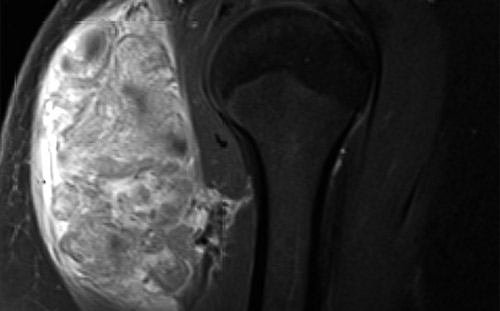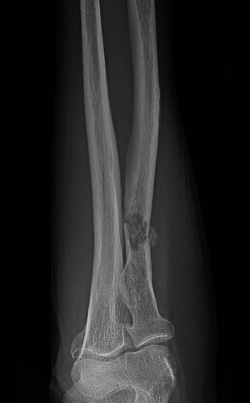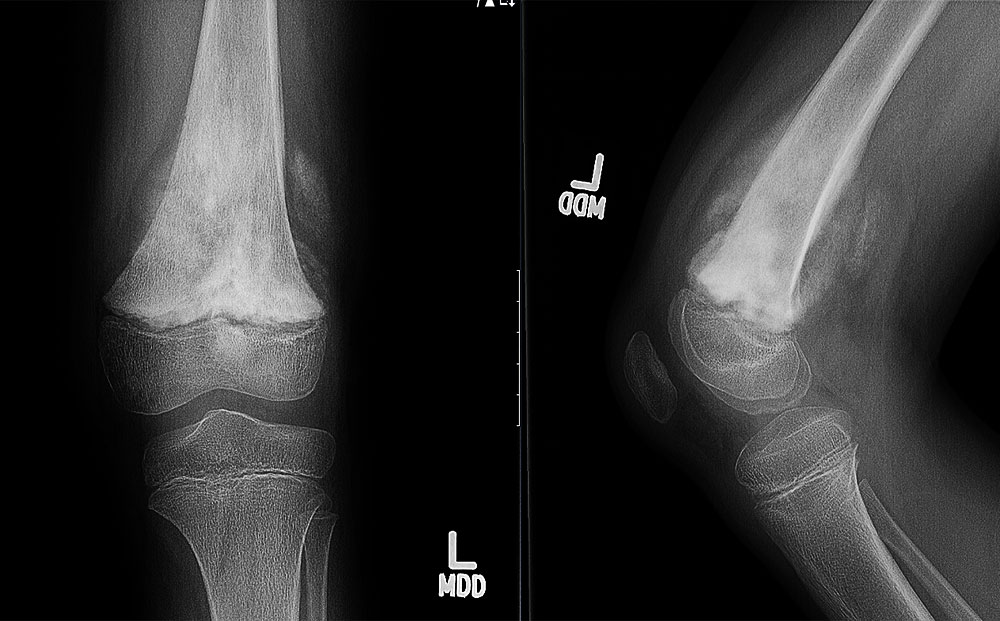Expert, Multidisciplinary Care for Patients with Musculoskeletal Tumors
At University Hospitals, patients with bone and soft tissue tumors, both benign and malignant, have access to the most advanced diagnostic methods and state-of-the-art treatment options available. The services of our skilled team, which includes surgeons and oncologists from UH Seidman Cancer Center, are coordinated through a single point of contact, offering convenience for both the patient and the referring physician. Our physician-specialists then discuss all the treatment options with the patient, their family and the referring physician with the goal of creating a highly personalized treatment plan.
Call to Schedule an Appointment Today
If you have been diagnosed with a bone or soft tissue tumor, call 216-844-7200 today to schedule a consultation with a UH orthopedic oncology expert.
What is Orthopedic Oncology?

Orthopedic oncology is a subspecialty of orthopedic surgery. Surgeons who practice orthopedic oncology specialize in treating cancerous and non-cancerous tumors of the musculoskeletal system including the bone, muscles, ligaments and tendons.
The field is highly multidisciplinary and those who practice within the field work closely with medical oncologists, radiation oncologists, plastic surgeons, general surgeons as well as physical therapists, nutritionists and prosthetists. The treatments provided by orthopedic oncologists focus on complete removal of the tumor, functional limb salvage and long term surveillance.
Orthopedic Oncologists Diagnose and Treat a Variety of Conditions

When a tumor of musculoskeletal tissue is cancerous, it is called sarcoma. It is the job of the orthopedic oncologist to diagnose these tumors and determine if they have spread.
In addition to sarcoma, orthopedic oncologist also treat lymphoma, multiple myeloma and metastatic cancers that come from other areas of the body such as the breast, lung, prostate, kidney and thyroid gland. Orthopedic oncologists are crucial contributors to the treatment plan for these patients as they can provide treatment options that have the potential to greatly improve quality of life. Orthopedic oncologists also treat non-cancerous tumors of the musculoskeletal system such as lipomas, neurovascular tumors, bone cysts, fibrous tumors and many others.
Advanced Treatments for Optimal Outcomes
In patients with musculoskeletal tumors, surgical removal of the tumor will often be the first recommendation, followed by surgical reconstruction of the affected area to restore function. Additional treatments may include:
- Limb salvage
- Chemotherapy
- Radiation therapy
- Biopsy
- Limb lengthening procedures
- Custom prosthetics
- Additional, highly specialized surgical procedures
What to expect during your first visit

Your first visit with one of our orthopedic oncologists will be a fact-finding mission. You will be asked to bring or send ahead of time all previously obtained imaging results and laboratory work. This is so that our surgeons can review your record and piece together what has been done, the most likely diagnoses, and what needs to be done next. If you haven't already had them performed, you can expect the surgeon to order bloodwork, X-rays, CT and/or MRI scans and potentially, a biopsy.
Not every patient who is referred to an orthopedic oncologist has cancer. Sometimes when a primary care physician sends a patient to one of these specialists it is simply because they want to be sure they aren't overlooking anything. In this case, your orthopedic oncologist may simply provide reassurance and recommend ongoing surveillance (active watching).
If you have a cancer diagnosis, the first appointment helps lay the groundwork for what may be a long-lasting relationship between you and your orthopedic oncologist. Your doctor will want to get to know you as a person and understand your activity level, lifestyle and long-term treatment goals. Once a diagnosis has been made, you and your surgeon will discuss the diagnosis, the long-term expectations and your available treatment options.
Orthopedic Oncology Frequently Asked Questions
Brandon Jonard, MD explains the treatment options for soft tissue sarcoma, bone sarcoma and 3D custom implants for bone cancer patients.
What Are the Treatment Options for Soft Tissue Sarcoma?
What Are the Treatment Options for Bone Sarcoma?
Why Are 3D Custom Implants Used for Bone Cancer Patients?
Meet the Ortho Oncology and Musculoskeletal Tumors Providers
Brandon Jonard, MD
- Orthopedic Adult Reconstructive Surgery, Orthopedic Oncology, Orthopedic Trauma Surgery
-
Chardon (21 mi.)
Cleveland (0 mi.)
Beachwood (5 mi.)
Westlake (15 mi.)
Hudson (22 mi.)
Your health is important. Get expert care.
Offering in-person and virtual visits.
Call 440-656-4164 to see which option is right for you or schedule online today. Learn more about virtual visit
We Accept Most Insurance Plans
UH accepts most major insurance plans. However, it is best to check with your health plan to confirm that University Hospitals is included. View accepted insurance plans.


